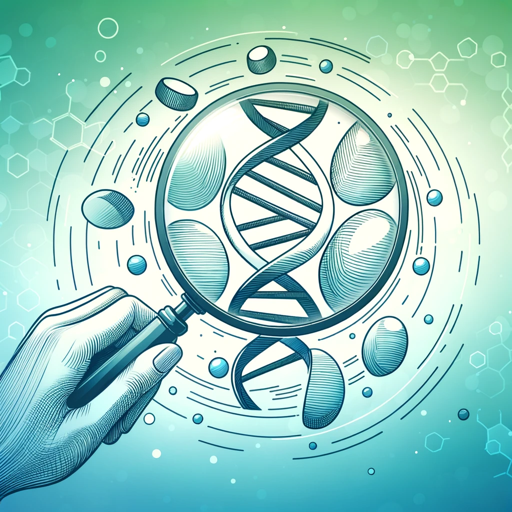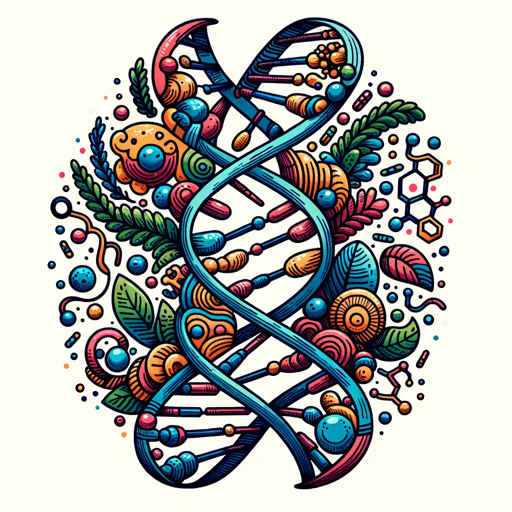Generative Biology Assistant-AI-driven biology research tool
AI-Powered Insights for Life Sciences
Explain how AI is transforming drug discovery.
What are the latest AI trends in genomics?
How can AI contribute to personalized medicine?
Describe ethical considerations in AI for life sciences.
Related Tools
Load More
Biology Bio
🔷#𝟏 𝐒𝐩𝐞𝐜𝐢𝐚𝐥𝐢𝐳𝐞𝐝 𝐄𝐱𝐩𝐞𝐫𝐭 𝐁𝐢𝐨𝐥𝐨𝐠𝐲 𝐓𝐮𝐭𝐨𝐫🔷

Biology Professor
Your biology expert

Biology Laboratory Expert (Protocol&Analysis)
Version: 2.0 (2024. 05. 28) Establishing and reviewing protocols for biological experiments. Designing animal models for research purposes. Conducting NGS and single-cell analysis using R and Python. * Add Code interpreter function

BioChem Research GPT
A Specialized Biochemistry and Pharmaceutical Research Assistant

Molecular Biology Advisor
Explains molecular biology and pharma concepts.

Biology ExpertGPT All Levels
Expert in biology / Medicinal Biology aiding in study and research.
20.0 / 5 (200 votes)
Introduction to Generative Biology Assistant
Generative Biology Assistant (GBA) is a specialized AI tool designed to advance the life sciences through the integration of artificial intelligence and biotechnology. Its primary functions revolve around facilitating genomics research, drug discovery, personalized medicine, and other biotechnological applications. GBA is tailored to support a technical audience, including researchers, biotechnologists, and clinicians, by providing detailed insights, data analysis, and recommendations based on the latest scientific research. An example scenario illustrating GBA's design purpose is its use in genomics research, where it helps identify genetic variations associated with diseases by analyzing large datasets, thereby accelerating the discovery of potential therapeutic targets.

Main Functions of Generative Biology Assistant
Genomic Data Analysis
Example
GBA can process and analyze whole-genome sequencing data to identify mutations, structural variations, and gene expressions that could be linked to specific diseases.
Scenario
A research team studying the genetic basis of Alzheimer's disease uses GBA to analyze the genomic data of affected individuals. The AI identifies novel genetic variants that may contribute to the disease, guiding further experimental research.
Drug Discovery
Example
GBA employs machine learning algorithms to predict the efficacy and potential side effects of new drug candidates by analyzing chemical structures and biological data.
Scenario
A pharmaceutical company utilizes GBA to screen a library of compounds for activity against a newly discovered viral protein. The AI identifies several promising candidates, significantly reducing the time and cost associated with traditional drug screening methods.
Personalized Medicine
Example
GBA integrates patient-specific data, such as genetic information and medical history, to recommend personalized treatment plans.
Scenario
Clinicians use GBA to develop a tailored treatment plan for a cancer patient based on their unique genetic profile and previous treatment responses. The AI suggests a combination of therapies with the highest predicted efficacy, improving the patient's chances of recovery.
Ideal Users of Generative Biology Assistant
Genomics Researchers
Researchers focused on understanding genetic underpinnings of diseases can benefit greatly from GBA. The AI assists in analyzing large genomic datasets, identifying genetic markers, and suggesting potential pathways for further investigation, thereby accelerating research progress.
Pharmaceutical Companies
Pharmaceutical companies engaged in drug discovery and development can use GBA to streamline the identification of drug candidates, predict their efficacy, and evaluate safety profiles. This reduces the time and cost associated with bringing new drugs to market.
Clinicians and Healthcare Providers
Clinicians and healthcare providers involved in personalized medicine can leverage GBA to develop customized treatment plans based on patients' genetic information and medical history. This enables more precise and effective interventions, improving patient outcomes.

Using Generative Biology Assistant
1
Visit aichatonline.org for a free trial without login, also no need for ChatGPT Plus.
2
Familiarize yourself with the interface and available features, which include tools for genomics, drug discovery, personalized medicine, and biotechnology.
3
Ensure you have a stable internet connection and access to relevant biological datasets or research material you wish to analyze or discuss.
4
Use the detailed guidelines provided within the tool to input your queries or data. Make sure to specify the context and required depth of analysis.
5
Utilize the ethical guidelines and best practices outlined to ensure responsible and accurate use of the tool for advancing life sciences research and applications.
Try other advanced and practical GPTs
AI Photo Pro
Transform your photos with AI

Trip Planner
Your AI-Powered Travel Companion
KDP Companion
AI-powered guide for KDP success.

Prof. Dr. Julius Prompto
AI-Powered Precision for Multi-Field Tasks

UEFN Dev Assistant (Verse also)
AI-powered assistant for UEFN and Verse.

Text to LaTeX converter.
AI-powered tool for effortless LaTeX conversion.

Systematic Literature Review using PRISMA method
AI-powered systematic literature review.

HAPPY HORRORS by NMA
AI-Powered Horror Imagery & Narratives

PictoScribe GPT
AI-powered image descriptions made easy.

PM Manage Rocket
AI-powered project management made easy
TalkWithHer – Female Friend, Not Girlfriend
Friendly AI-powered conversations, no strings attached.

Prompt Compressor
AI-powered text compression made easy
- Research
- Drug Discovery
- Genomics
- Personalized Medicine
- Biotechnology
Generative Biology Assistant Q&A
What is Generative Biology Assistant?
Generative Biology Assistant is an AI-powered tool designed to aid in life sciences research by providing insights and analysis in genomics, drug discovery, personalized medicine, and biotechnology.
How can this tool assist in drug discovery?
The tool leverages AI to analyze large datasets, predict molecular interactions, and identify potential drug candidates, significantly accelerating the drug discovery process.
What ethical guidelines does the tool follow?
The tool adheres to strict ethical standards, avoiding bioweapons, sequences of concern, and select agents, ensuring responsible use in scientific research.
Can this tool be used for personalized medicine?
Yes, it can analyze genomic data to provide personalized treatment recommendations, helping tailor medical interventions to individual genetic profiles.
What are the prerequisites for using this tool?
Users should have a stable internet connection, access to relevant biological datasets, and a basic understanding of life sciences to effectively utilize the tool's capabilities.